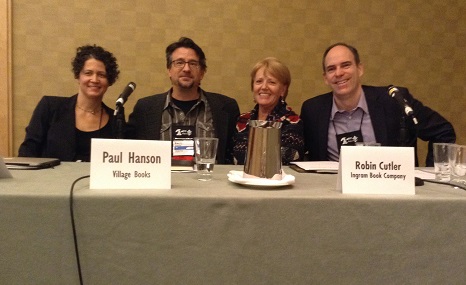- Categories:
Indie Booksellers and the Business of Self-Publishing Explored at Wi9

The Winter Institute education session “Indie Booksellers and the Business of Self-Publishing” examined the growth in self-publishing and outlined ways that independent booksellers can serve authors in their communities while benefiting their businesses.
On the panel were Paul Hanson, general manager of Bellingham, Washington’s Village Books; Karen Schechner, senior indie editor of Kirkus Reviews; Robin Cutler, manager of content acquisition at Ingram Book Company; and Mark Lefebvre, director of self-publishing and author relations at Kobo.
As a bookseller and an independently published author himself, Hanson said that he knew firsthand both the intricacies of the process and the difficulties facing authors who are trying to publish on their own. “Publishing, printing, distribution, finding editing, and getting reviewed are huge hurdles for any author,” he said, adding that, in the past, when authors asked for help, he didn’t always have an answer and wished the industry had more options. “Well, thank god, we have those options now,” he said.
Village Books offers a range of publishing services of its own and, when appropriate, will refer customers to other options like the Kirkus Indie, Ingram Spark, and Kobo Writing Life programs. Whatever the option, Hanson said, it’s crucial for booksellers to manage customers’ expectations about the self-publishing process from the beginning.
The goal of Kirkus Indie, said Schechner, is to “help booksellers easily expand their author services.” To that end, it offers both editorial and book review services. The editorial work is done by former “big six” editors who are vetted by Kirkus, “so booksellers can feel confident in recommending Kirkus editorial services to their customers,” she said.
Authors can also purchase a review from $425-$575 on the Kirkus website. By entering a promo code and the name of the referring bookstore, an author will receive $25 off the price of the review and the bookstore will receive a $25 referral fee. But reviewers will “call them like they see them,” said Schechner, adding that Kirkus Indie has the same strict editorial standards as the rest of the magazine. While authors can buy a review, they can’t buy a positive review.
After receiving a review, an author has the option to publish it or keep it private. Importantly for the bookstore, Kirkus handles all customer service issues.
Besides adding to a bookstore’s list of services, participating in the Kirkus Indie program is “a way for a bookstore to play a significant role in helping a writer become successful,” said Schechner.
Booksellers with questions about Kirkus Indie and those who wish to receive the promo code for review referrals should contact Schechner via e-mail.
For the last 15 years, Ingram has been a global leader in print-on-demand technology through Lightning Source, said Robin Cutler. CoreSource, Ingram’s digital distribution program, has allowed publishers to quickly and easily deliver content.
Ingram Spark, which was launched at last year’s BEA, is a marriage of these two technologies, said Cutler. Though Lightning Source has been working with self-published authors for some time, it was designed for traditional publishers. Ingram Spark was introduced because “we want to make it easier to do business with Ingram,” said Cutler, “and to provide a service specifically for the self-publishing market.”
Cutler said the platform was designed with ease of use in mind, and it combines physical and digital content management with print-on-demand and e-book technology in the same interface. For $49, plus an annual access fee of $12, authors are able to set up their title and have access to Ingram’s print and e-book distribution services. Self-publishers have a number of options, including creating their own branding and setting a returnable status as well as wholesale discounts.
Enhancements on tap for Ingram Spark in 2014 include conversion and marketing services, as well as a partnership with Bowker that will allow authors to purchase ISBNs within the program instead having to purchase them from Bowker separately.
“We want to be able to have a soup-to-nuts solution for self publishers,” said Cutler.
Kobo Writing Life was “born with a desire to remove barriers for writers and small presses,” said Mark Lefebvre, who was a bookseller for 20 years and self-published his own book in 2004 through Ingram’s Lightning Source.
The design and care put into the dashboard are among the features of Kobo Writing Life that are most valued by authors, Lefebvre said. Through the dashboard, authors can see how many books they are selling, and where they’re selling. Authors can control pricing for each territory, set promotional pricing, and help plan publicity by implementing the option for preordering.
Authors receive 70 percent royalties on books priced $2.99 and up. They are paid electronically in the currency of their choice, and they maintain all the rights to their content, making it easy for an author to sell the rights to their work.
Kobo’s partnership with ABA has allowed the company to work with independent bookstores to host in-store Kobo Writing Life workshops for authors interested in self-publishing.
“The reality is, customers want to shop in the store they love,” said Lefebvre. “And we want to continue to allow them to do that.”

